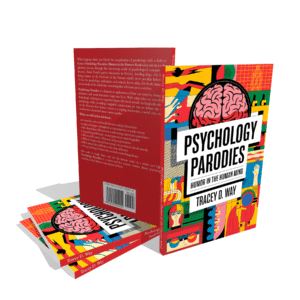Psychology Parodies: Humor in the Human Mind – Complete Guide to Understanding Psychology Through Comedy

Psychology parodies offer a revolutionary approach to understanding complex psychological concepts through the power of laughter and wit. If you’ve ever struggled to grasp dense psychological theories or found traditional psychology textbooks overwhelming, “Psychology Parodies: Humor in the Human Mind” by Tracey D. Way provides the perfect solution. This innovative 112-page ebook transforms intimidating psychological concepts into accessible, entertaining content that makes learning both enjoyable and memorable.
Unlike traditional psychology books that can feel academic and distant, this psychology humor book bridges the gap between complex theories and everyday understanding. Through clever satirical interpretations of Freudian theories, Pavlovian conditioning, and cognitive biases, readers discover how humor can illuminate the deepest aspects of human behavior while providing practical insights for daily life.
What You’ll Discover
- Freudian Theory Parodies: Learn how classic psychoanalytic concepts become hilariously relatable through satirical reinterpretations of the unconscious mind, dream analysis, and psychological defense mechanisms
- Cognitive Bias Comedy: Master the art of recognizing your own thought patterns and decision-making quirks through humorous examples that make complex psychological principles crystal clear
- Jungian Archetypes Reimagined: Discover how archetypal characters come to life through comedic narratives that help you understand personality types and human behavior patterns
- Humor Therapy Techniques: Transform your emotional resilience and social connections by learning practical applications of laughter as a psychological coping mechanism
- Pavlovian Conditioning Parodies: Overcome limiting behavioral patterns by understanding classical conditioning through entertaining examples that reveal how stimulus-response cycles shape daily life
- Psychology Communication Skills: Enhance your interpersonal relationships and conflict resolution abilities using humor as a bridge for better understanding and connection
Why This Book Matters
Psychology parodies represent more than simple entertainment—they serve as powerful educational tools that make complex psychological theories accessible to everyone. This comprehensive guide addresses the common frustration many people experience when trying to understand traditional psychology materials, offering a refreshing alternative that engages both intellect and emotions through strategic use of humor therapy principles.
The book’s unique approach helps readers overcome psychological resistance to challenging topics while building genuine understanding of human behavior patterns. By presenting serious psychological concepts through comedic lens, you’ll develop practical skills for recognizing cognitive biases, improving emotional intelligence, and applying psychological insights to enhance your personal and professional relationships immediately.
Key Features
This comprehensive ebook spans 112 pages covering Freudian theories, cognitive biases, Jungian archetypes, and humor therapy applications. Available as an instant digital download, you’ll receive immediate access to satirical psychological insights, practical exercises, and real-world applications. The format allows for easy reading on any device, with memorable examples that stick with you long after reading. Also available as audiobook on Google Play Books and Spotify for convenient listening during commutes or workouts.
Frequently Asked Questions
How do psychology parodies help with understanding complex psychological concepts better?
Psychology parodies simplify intimidating theories by presenting them through humor, making information more memorable and less threatening. When Freudian concepts are transformed into comedic scenarios, readers grasp psychological dynamics more easily while reducing resistance to challenging topics.
Can humor therapy techniques from this psychology humor book be applied in real life?
Absolutely! The book provides practical applications for using humor as a coping mechanism, improving emotional resilience, and enhancing social connections. These techniques help with stress management, conflict resolution, and building stronger interpersonal relationships.
Is this psychology parodies book suitable for beginners without psychology background?
Yes, this book is specifically designed to make psychology accessible to everyone. No prior knowledge is needed—the humorous approach breaks down complex theories into understandable, relatable content that appeals to both beginners and psychology enthusiasts.
Get Your Copy Today
Transform your understanding of psychology with this comprehensive guide to humor in the human mind. Available for instant download at just $6.99, this ebook provides exceptional value compared to expensive psychology courses or textbooks. Also available as audiobook on Google Play Books and Spotify for flexible learning. Purchase your copy through all major ebook retailers including Apple Books, Barnes & Noble, and Kobo to begin mastering psychology through humor today.
Watch the Video Review

